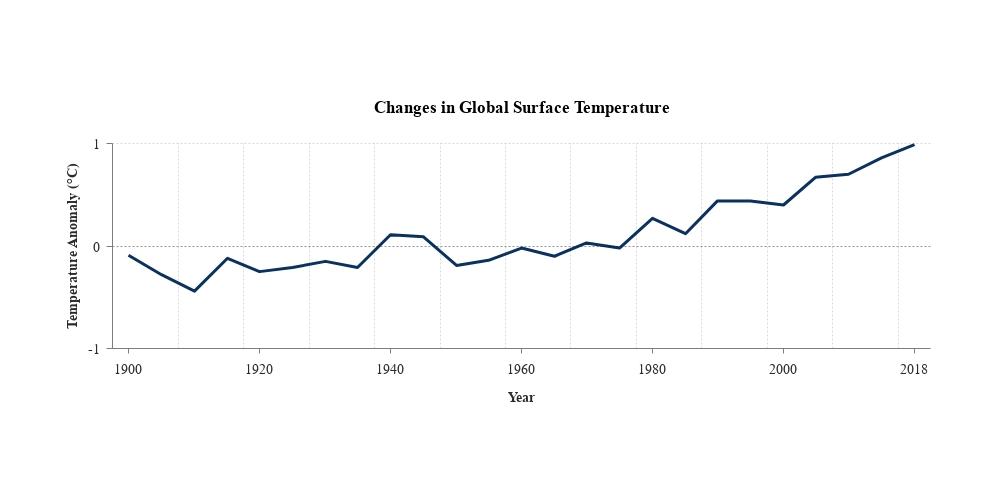 The year is 2030 and you can bid farewell to 99 percent of Earth’s coral reefs, any chance of buying chocolate and a vacation to your favorite coastal destination. You can also say goodbye to the prospect of saving the planet from the perils of climate change.
The year is 2030 and you can bid farewell to 99 percent of Earth’s coral reefs, any chance of buying chocolate and a vacation to your favorite coastal destination. You can also say goodbye to the prospect of saving the planet from the perils of climate change.
Enter the Intergovernmental Panel on Climate Change’s latest report. Along with its findings on the impacts of climate change and sustainability, it details how we are not on the necessary track to restrict global temperature rise to 1.5 degrees Celsius, the limit set by scientists. More importantly, we only have twelve years to act before climate change takes its full, irreversible toll on the planet. And, in order for there to be any hope of positive change occurring, drastic efforts need to be made right now.
Current climate trends forecast a two degree rise in temperature by 2100, raising the average global temperature 35.6 degrees Fahrenheit. A two degree increase may not seem like much; however, the difference between Earth’s surface temperature today and during the last ice age is only four to seven degrees.
To limit global temperature increase to 1.5 degrees, net carbon dioxide emissions must be virtually eliminated and all environmental pollutants reduced significantly by 2050. To put this challenge in perspective, 2016’s global carbon emissions from the burning of fossil fuels alone totalled 36.18 gigatons. According to the IPCC study co-chair Debra Roberts, “the next few years are probably the most important in human history.”
It is no secret that climate change has already inflicted permanent scars on Earth and will continue to do so, with its impacts becoming more drastic over time. The evidence lies in decades of research that has proven its effects, spanning from extreme weather events to sea level rise and the extinction of key species.
There are still people who question the legitimacy of this evidence, however, and some simply claim that climate change is a hoax. According to The Economist, in a poll spanning 38 countries, 61 percent of people viewed climate change as largely threatening in 2017. In other words, almost a third of the world is either unaware of or refuses to believe in the extent of climate change’s effects. While even the most informed scientists admit that it is hard to picture a world where natural disasters are a normal component of weather and certain parts are too hot to be habitable, this is no reason to dismiss the picture as inaccurate.
In response to the National Climate Assessment released by the federal government in November, President Trump simply said, “I don’t believe it.”
Trump also withdrew the US from the Paris Climate Accord in 2017, halting action on climate change at the national level. State efforts towards cutting carbon emissions and encouraging sustainability continue to be thwarted by the Trump Administration’s relaxation of the U.S. Environmental Protection Agency clean air regulations. We cannot restrict a two degree rise if we are not on the same page as a nation and planet regarding the existence and urgency of climate change.
A commonly discussed and experienced effect of climate change is an increase in the frequency and magnitude of natural disasters, which wreak havoc on both the economy and people’s lives. CBS News noted that natural disasters cost the United States $306 billion in 2017, a record amount spent in the aftermath of 16 disasters that took at least 362 lives, if not more.
It is distressing that hearing of natural disasters around me does not faze me anymore, much less how I have almost come to accept the projected catastrophe of the world and its resources. It is easy to live in our own bubbles and dismiss the fate of those featured in distant news articles, but when we experience the effects of climate change ourselves, we will no longer be able to ignore it.
Our generation has been placed in a massive predicament, and it is up to us to be attentive, global citizens dedicated to facilitating change. The least we can do is educate those around us who are skeptical of climate change, keep our carbon footprints clean and vote in the interest of the environment when we are old enough to do so. Every person out of Earth’s seven billion who uses greener transportation, reduces their meat consumption and uses natural resources sparingly will make a lasting difference. Every sheet of paper saved and each small carbon emission that is avoided counts towards change. Those who are not part of the solution will continue to be part of the problem. We cannot further delay action while still ensuring that our children will have a world to live in.






































Ihagh G. T. • Feb 10, 2019 at 9:20 pm
very insightful, interesting and informative post